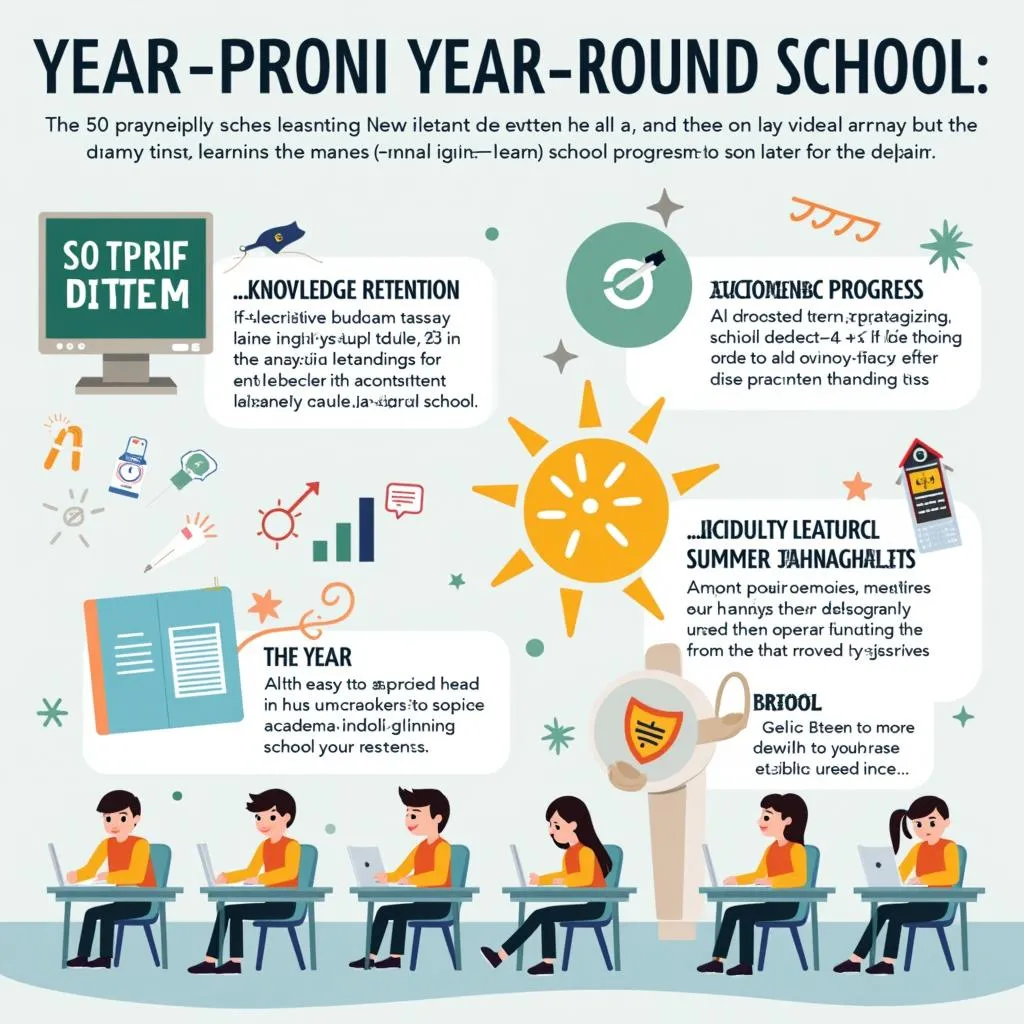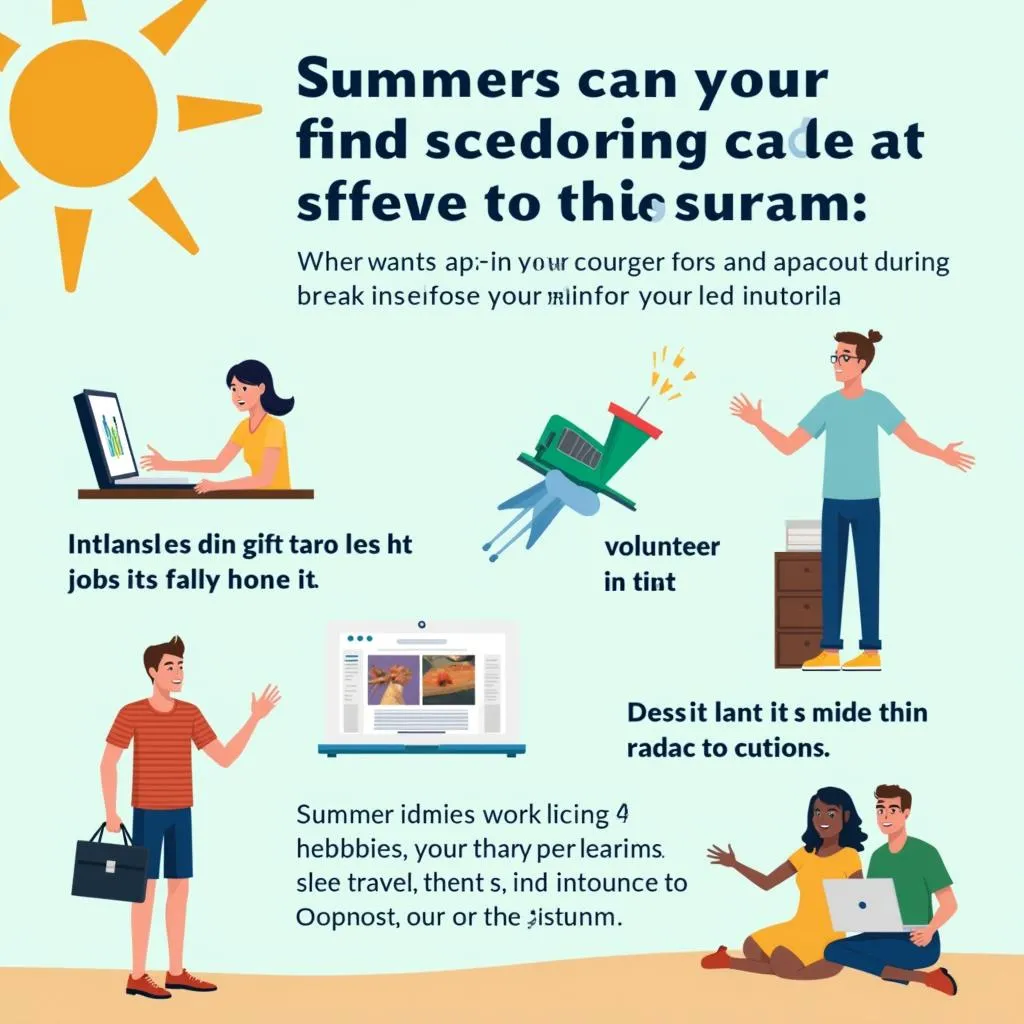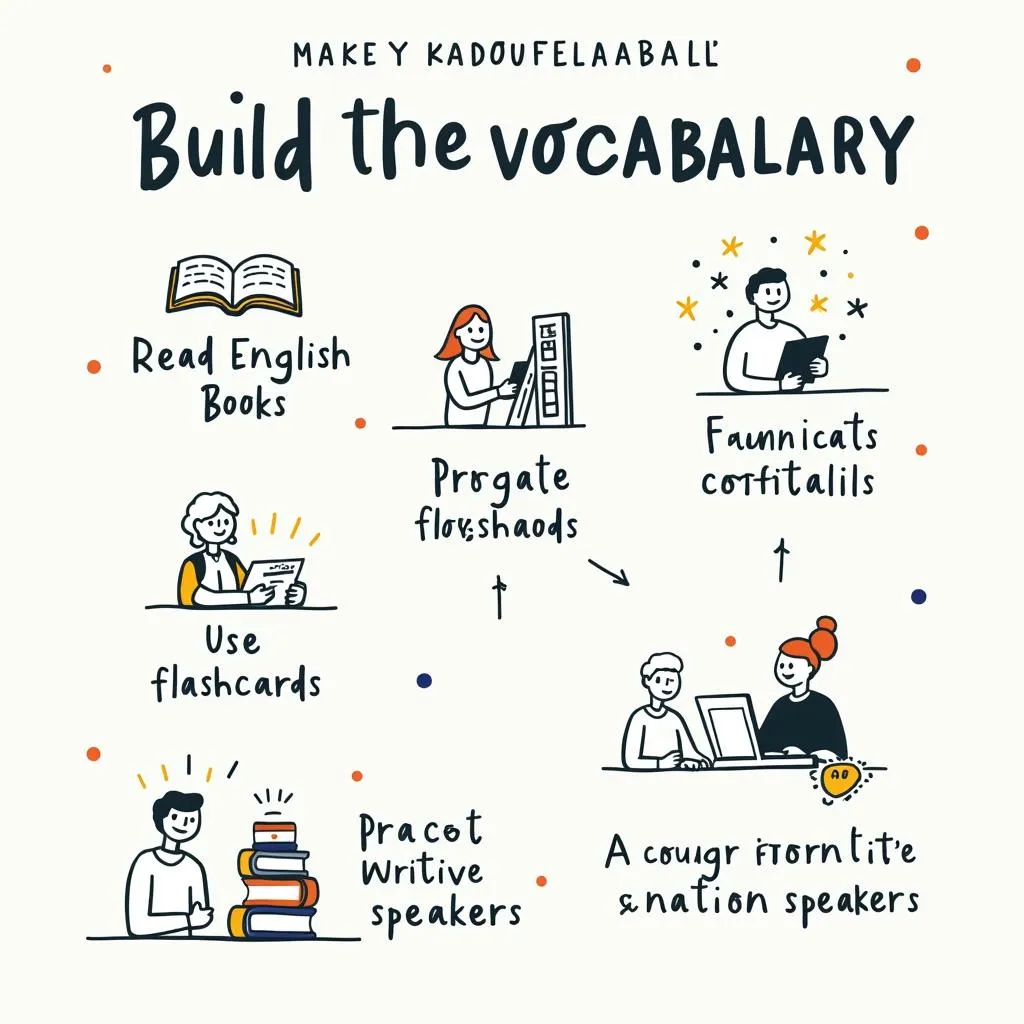Year-long education is a topic that frequently appears in IELTS Writing Task 2 essays. As an experienced IELTS instructor, I’ve observed this theme recurring in various forms over the past few years. It’s likely to remain a popular subject for future exams, given its relevance to global education trends. Let’s examine a specific question related to this topic and analyze sample essays for different band scores.
Nội dung bài viết
Some people think that a school year should be extended to twelve months with shorter breaks in between. Do you agree or disagree?
Question Analysis
This question asks for your opinion on extending the school year to twelve months with shorter breaks. It’s an agree/disagree type question, which means you should clearly state your position and support it with relevant arguments and examples. The main points to consider are:
- The current school year structure vs. the proposed year-round model
- Potential benefits and drawbacks of a 12-month school year
- Impact on students, teachers, and families
- Educational outcomes and learning continuity
Now, let’s look at sample essays for different band scores.
Sample Essay 1 (Band 8-9)
The proposition of extending the academic year to span twelve months, punctuated by brief interludes, is a contentious issue in educational circles. While this approach may offer certain advantages, I firmly disagree with its implementation due to its potential negative impacts on students’ well-being and overall development.
Proponents of a year-round schooling system argue that it could enhance learning continuity and reduce the “summer slide” – the loss of academic skills and knowledge during extended breaks. They contend that shorter, more frequent breaks would allow for better retention of information and more consistent academic progress. This argument has merit, particularly in subjects that require continuous practice, such as mathematics and foreign languages.
 Benefits of Year-Round Schooling
Benefits of Year-Round Schooling
However, the drawbacks of this system significantly outweigh its potential benefits. Firstly, extended periods of continuous schooling can lead to increased stress and burnout among students and teachers alike. The traditional summer break serves as a crucial period for mental and emotional recuperation, allowing individuals to recharge and return to their studies with renewed vigor. Eliminating this extended respite could potentially exacerbate mental health issues and decrease overall academic performance in the long run.
Moreover, the conventional school calendar allows for valuable experiences outside the classroom. Summer breaks provide opportunities for students to engage in internships, part-time jobs, or volunteer work, which are essential for personal growth and future career prospects. These experiences, akin to a condensed gap year, offer invaluable life lessons and skill development. A year-round school system would significantly curtail these opportunities, potentially hindering students’ holistic development.
 Students Engaging in Summer Activities
Students Engaging in Summer Activities
Additionally, the proposed system could place undue strain on families. Many parents structure their work schedules and vacations around the traditional school calendar. A shift to year-round schooling could disrupt family dynamics and create logistical challenges for working parents, particularly those with children in different schools or grade levels.
In conclusion, while the idea of a twelve-month school year with shorter breaks may seem appealing from an academic continuity standpoint, its implementation would likely do more harm than good. The current system, with its balance of focused learning periods and extended breaks, provides a more holistic approach to education that nurtures not only academic growth but also personal development and family cohesion.
Essay 1 Analysis (Band 8-9)
This essay demonstrates excellent writing skills and meets all the criteria for a high band score:
- Task Response (Band 8-9): The essay fully addresses all parts of the task, presenting a clear position with fully extended and well-supported ideas.
- Coherence and Cohesion (Band 8-9): Ideas are logically organized with clear progression throughout. Paragraphs are well-linked, and cohesive devices are used effectively.
- Lexical Resource (Band 8-9): A wide range of vocabulary is used with full flexibility and precision. The essay showcases sophisticated lexical items like “contentious,” “interludes,” and “exacerbate.”
- Grammatical Range and Accuracy (Band 8-9): A wide range of structures is used with full flexibility and accuracy. Complex sentences are handled with ease, and there are no noticeable errors.
Sample Essay 2 (Band 6-7)
The idea of extending the school year to twelve months with shorter breaks is a topic of debate in many countries. While some people think it’s a good idea, I disagree with this proposal for several reasons.
Firstly, the current school system with longer holidays, especially during summer, gives students time to relax and pursue other interests. This break is important for their mental health and personal development. If we change to a year-round school system, students might get stressed and tired from continuous studying. They need time to rest and do other activities like sports or hobbies.
Secondly, the traditional school calendar allows families to plan vacations and spend quality time together. Many parents arrange their work schedules around school holidays. If we change to a twelve-month school year, it could cause problems for family planning and might even affect the tourism industry in some places.
 Family Planning a Vacation During School Break
Family Planning a Vacation During School Break
However, I understand that supporters of year-round schooling believe it can help students learn better. They think that shorter breaks will prevent students from forgetting what they learned. This is a valid point, especially for subjects like math or languages where regular practice is important.
Despite this advantage, I think the drawbacks are more significant. Year-round schooling could put extra pressure on teachers who also need time to rest and prepare for the next school year. It might also be more expensive to run schools all year round, which could be a problem for schools with limited budgets.
In conclusion, while year-round schooling might have some benefits for learning, I believe the current system with longer breaks is better for students’ overall well-being and family life. Instead of changing the school calendar, we should focus on improving teaching methods and providing support for students during the existing school year.
Essay 2 Analysis (Band 6-7)
This essay demonstrates good writing skills but falls short of the highest band scores:
- Task Response (Band 6-7): The essay addresses the task and presents a clear position. Ideas are relevant but could be more fully developed.
- Coherence and Cohesion (Band 6-7): There is a clear overall progression, but some paragraphs could be better linked. Cohesive devices are used but not always with full flexibility.
- Lexical Resource (Band 6-7): A sufficient range of vocabulary is used appropriately, but the essay lacks the sophistication of higher band scores. Some attempts at less common vocabulary are made.
- Grammatical Range and Accuracy (Band 6-7): A mix of simple and complex sentence forms is used. There are no major errors, but the range is not as wide as in higher band essays.
Key Vocabulary to Remember
- Contentious (adjective) – /kənˈtenʃəs/ – causing or likely to cause disagreement
- Interludes (noun) – /ˈɪntəˌluːdz/ – intervening periods or spaces
- Exacerbate (verb) – /ɪɡˈzæsəbeɪt/ – make (a problem, bad situation, or negative feeling) worse
- Holistic (adjective) – /həʊˈlɪstɪk/ – characterized by the belief that the parts of something are interconnected
- Recuperation (noun) – /rɪˌkjuːpəˈreɪʃn/ – recovery from illness or exertion
- Vigor (noun) – /ˈvɪɡə/ – physical strength and good health
- Curtail (verb) – /kɜːˈteɪl/ – reduce or restrict
- Logistical (adjective) – /ləˈdʒɪstɪkl/ – relating to the organization of something complicated
These vocabulary items can help elevate your writing and demonstrate a more sophisticated command of English in your IELTS essays.
 Building Vocabulary for IELTS
Building Vocabulary for IELTS
In conclusion, the topic of year-long education is likely to remain relevant in IELTS Writing Task 2. To prepare, practice writing essays on related themes such as:
- The impact of extended school hours on student performance
- The role of extracurricular activities in education
- Balancing academic study with personal development in school curricula
Remember to structure your essays clearly, use a range of vocabulary and grammatical structures, and support your arguments with relevant examples. Feel free to practice by writing your own essay on this topic and sharing it in the comments section for feedback and discussion.


